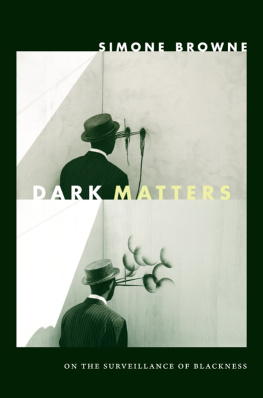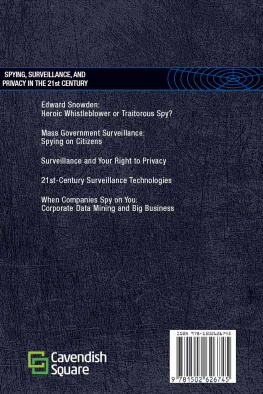DARK MATTERS
2015 DUKE UNIVERSITY PRESS. All rights reserved
Printed in the United States of America on acid-free paper
Designed by Natalie F. Smith
Typeset in Arno Pro by Graphic Composition, Inc., Athens, GA
Library of Congress Cataloging-in-Publication Data
Browne, Simone, [date] author.
Dark matters : on the surveillance of blackness / Simone Browne.
pages cm
Includes bibliographical references and index.
ISBN 978-0-8223-5919-7 (hardcover : alk. paper)
ISBN 978-2-8223-5938-8 (pbk. : alk. paper)
ISBN 978-0-8223-7530-2 (e-book)
1. African AmericansSocial conditions. 2. BlacksCanadaSocial conditions. 3. United StatesRace relations. 4. CanadaRace relations. 5. Electronic surveillanceUnited States. 6. Government informationUnited States. I. Title.
E185.86.B76 2015
305.896073dc23 2015012563
COVER ART: Robin Rhode (South African, born 1976), Pans Opticon, 2008. Photographs, fifteen C-prints face-mounted on four-ply museum board. Photos courtesy of Lehmann Maupin.
Duke University Press gratefully acknowledges the support of the Office of the President at the University of Texas at Austin, which provided funds toward the publication of this book.
CONTENTS
Guide
This book began as notes that I scribbled in the margins while I was conducting dissertation research at the University of Toronto. Although it is not based on that work, many of the questions and concerns that shape this book emerged from that project. Thank you to my PhD committee members Kari Dehli, Roxana Ng, Alissa Trotz, and David Lyon for their guidance, support, and sharp readings of that work.
My appreciation goes out to colleagues, past and present, at the University of Texas at Austin who have made suggestions, pointed me in new directions, provided feedback, and read parts of the book along the way. I thank Joo Costa Vargas, Stephen Marshall, Naomi Paik, Nhi Lieu, Meta DuEwa Jones, Shirley Thompson, and Michael Ray Charles. Ben Carrington commented on many chapter drafts, iterations, and the entire manuscript. I am grateful for the insights that his readings have brought to this book. Ted Gordons support for me and my work has been unwavering. I thank him for showing me the possibilities of maroon spaces. Special thanks to those who provided words of encouragement and support for this project: Jossianna Arroyo, Ann Cvetkovich, Lyndon Gill, Sam Gosling, Frank Guridy, Charlie Hale, Susan Heinzelman, Neville Hoad, Juliet Hooker, Bob Jensen, Omi Jones, Xavier Livermon, Minkah Makalani, Leonard Moore, Lisa Moore, Deborah Paredez, Anna-Lisa Plant, Cherise Smith, Eric Tang, and Craig Watkins. I would also like to thank my colleagues in the Sociology Department, especially Bob Hummer, Keith Robinson, Mary Rose, Marc Musick, Michael Young, and Maya Charrad. I consider myself truly lucky to have met the many students from my graduate seminars and undergraduate classes who have critically engaged with parts and pieces of what would become this book, with a special thanks to Courtney Williams Barron, Josh Bidwell, Jessica Dunning-Lozano, Amanda Gray, Lily Laux, and Elissa Underwood.
I appreciate the many colleagues and friends who have supported me and have made this book better through their questions, conversations, correspondence, enthusiasm, and advice, with many of those mentioned here having generously read parts, or all, of this book. I thank Cathy N. Davidson, David Theo Goldberg, Avery Gordon, Gary T. Marx, Torin Monahan, Lisa Nakamura, Mark Anthony Neal, Howard Winant, Fiona Barnett, Zach Blas, Marc Bhlen, Eduardo Bonilla-Silva, Micha Crdenas, Danielle Dirks, Joe Feagin, Allen Feldman, Caitlin Fisher, Martin French, Ahmed Ghappour, Ruthie Gilmore, Sarah Ihmoud, Richard Iton, Joy James, David Leonard, Steve Mann, Nicholas Mirzoeff, Alondra Nelson, Tamara K. Nopper, Mark Olson, Jenny Rhee, Mark B. Salter, Christina Sharpe, Maggie Tate, France Winddance Twine, David Murakami Wood, and Clyde Woods. I am especially grateful for Katherine McKittricks friendship, her brilliance, and her many visits to Austin. Her fierce commentary on so many parts of this book has been invaluable. My sincerest appreciation goes to Rinaldo Walcott for his encouragement, his mentorship, his generous feedback, and for the semester that he sojourned in Austin.
Ive had opportunities to present my research at various venues, which have greatly enriched this book. I am thankful for all that Ive learned from the rigorous questions and comments, and in particular those from audiences at the Surveillance Studies Center at Queens University, HASTAC conferences in Durham and Toronto, CUNY Graduate Center, University of California at Berkeley, University of California at Santa Barbara, University of Ottawa, and New York University.
I am so grateful to Cathy for her incredible kindness and for creating a timely and safe space for me at the Franklin Center.
Duke University Press has been a dream (come true) to publish with. Since our first meeting at Parker and Otis, Courtney Berger has been an amazing editor. I deeply thank her for her commitment to this book and for her insights and advice throughout. Thank you to Erin Hanas for her step-by-step guidance through the editorial process. I also want to thank the production team at Duke, and in particular Christopher Robinson, Danielle Houtz, and Karen M. Fisher. A big thanks also to Ken Wissoker. I am especially indebted to the two anonymous reviewers for their fierce critique and for investing their time in order to make this book so much better.
I am eternally grateful for the friendship and support of Samia Rizek-Benisty and Samuel Benisty, Danielle Chow-Leong, Aliyah Hamirani, Almira Hamirani, Zahra Hamirani and family, Carrianne Leung, and Stella Meghie.
This book is dedicated with love to my family, especially James Bailey, Ena Bailey, and Elsa Constantine. To my mother, Carmel Browne, thank you for everything and for singing to me (or my answering machine) every day. To my father, Eardley Browne, thank you for all of your insights and encouragement and reading all of it. Again and again. To my brother, Kevin Browne, who has taught me so much about strength, love, survival, kindness, and humour.
AN EARLIER VERSION of have been revised from Digital Epidermalization: Race, Identity and Biometrics, Critical Sociology 36, no. 1 (2010): 131150.
The CIA can neither confirm nor deny the existence or nonexistence of records responsive to your request. Sometime in the spring of 2011, I wrote to the Central Intelligence Agency (CIA) and to the Federal Bureau of Investigation (FBI) to request the release of any documents pertaining to Frantz Fanon under the Freedom of Information Act (FOIA). At the of requested records is currently and properly classified and is intelligence sources and methods information that is protected from disclosure.
Fanons FOIA files that were released to me by the FBI consist only of three declassified documents: Document #105-96959-Aa clipping of a 1971 Washington Post-Times Herald article on Fanons Black Power Message and its continuing influence on the Caribbean island of Martinique, where he was born; Document #105-96959-1a once SECRET memo on Fanon dated March 9, 1961; and Document #105-96959-2a book review of David Cautes 1970 biography Frantz Fanon, filed under extremist matters, which says of Caute that his methodology bears the Marxist stamp and that he is no friend of the United States or of a free society. Document #105-96959-A, the news clipping, names The Wretched of the Earth (1963) as Fanons most important book, stating, its sales have run unusually high lately, especially among young Negroes. Document #105-96959-2, the FBIs own review of Cautes biography, describes Fanon as a black intellectual, a radical revolutionary, and a philosophical disciple of Karl Marx and Jean Paul Sartre, [who] preached global revolt of the blacks against white colonial rule, and says that Fanons


















